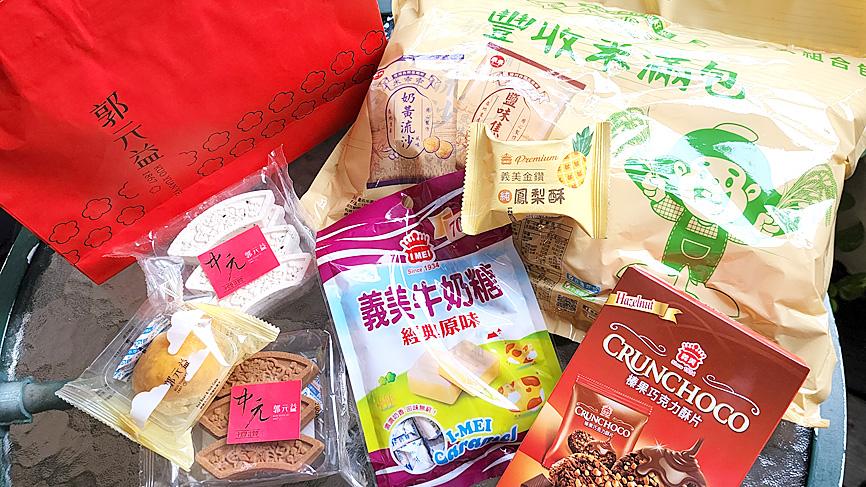China’s customs administration late on Monday announced bans on more than 100 Taiwanese food brands ahead of a visit by US House of Representatives Speaker Nancy Pelosi to Taiwan.
Beijing said that the blacklisted exporters — which include tea, honey and seafood producers — failed to renew their export registration and could therefore only sell their products until the end of this month.
The exporters may submit additional documents this month, Food and Drug Administration Director Wu Shou-mei (吳秀梅) said, adding that the agency would help them complete their registrations.

Photo: CNA
The bans might be politically motivated, as Taiwanese manufacturers were treated differently than those from other countries, she said.
Exporters from other countries can upload their registration documents online by June next year, while Taiwanese exporters had to submit the paperwork by June this year, she added.
She condemned the tight deadline, saying that “trade across the Taiwan Strait should not be conducted this way, as it needs time for communication.”
Council of Agriculture Minister Chen Chi-chung (陳吉仲) said the agency would soon announce remedial measures to help the exporters.
Taiwanese companies have registered 3,200 food products for export to China, 2,066 of which have been marked as “import suspended,” including those from Kuo Yuan Ye Corp (郭元益), Yu Jan Shin (裕珍馨), Kuai Kuai Co (乖乖), Imei Foods Co (義美食品), Chiate Bakery (佳德) and Kuang Ta Hsiang Foodstuffs Co (廣達香).
The banned manufacturers mainly produce prepared and processed foods such as pastries, whose export value to China and Hong Kong made up only 0.1 percent, or US$650 million, of Taiwan’s total exports, Ministry of Finance data showed.
As exports of food and drinks to China had already fallen due to the COVID-19 pandemic, the ban would have a greater effect on fishing boats and seafood exporters, a Ministry of Economic Affairs official said.
Taiwan last year exported US$44 million worth of pastries to China, but only US$10 million during the first half of this year, government data showed.
On the other hand, the total value of Taiwan’s seafood exports to China last year reached US$280 million and tea leaf exports reached US$31.67 million, while honey exports were only US$35,000.
Fifty-four fishing boats were asked to submit additional documents and the importation of more than 600 of their products was suspended, sources familiar with the issue said, adding that the bans prohibit the majority of Taiwanese seafood, tea and honey from reaching the Chinese market.
Beijing also requires fishing boats to submit Hazard Analysis and Critical Control Point (HACCP) certification, Wu said.
Fisheries Agency Director-General Chang Chih-sheng (張致盛) said that affected vessels include deep-sea fishing boats and offshore fishing boats, adding that the agency would help them obtain HACCP certification if they plan to export to China.
China last year suspended imports of Taiwanese pineapples, custard apples and wax apples, and in June banned grouper imports, claiming that it found pests and excessive levels of prohibited chemicals in the products.
Additional reporting by Cheng Chi-fang,
Huang Pei-chun and CNA

Taiwan would welcome the return of Honduras as a diplomatic ally if its next president decides to make such a move, Minister of Foreign Affairs Lin Chia-lung (林佳龍) said yesterday. “Of course, we would welcome Honduras if they want to restore diplomatic ties with Taiwan after their elections,” Lin said at a meeting of the legislature’s Foreign Affairs and National Defense Committee, when asked to comment on statements made by two of the three Honduran presidential candidates during the presidential campaign in the Central American country. Taiwan is paying close attention to the region as a whole in the wake of a

President William Lai (賴清德) has appointed former vice president Chen Chien-jen (陳建仁) to attend the late Pope Francis’ funeral at the Vatican City on Saturday on his behalf, the Ministry of Foreign Affairs said today. The Holy See announced Francis’ funeral would take place on Saturday at 10am in St Peter’s Square. The ministry expressed condolences over Francis’ passing and said that Chen would represent Taiwan at the funeral and offer condolences in person. Taiwan and the Vatican have a long-standing and close diplomatic relationship, the ministry said. Both sides agreed to have Chen represent Taiwan at the funeral, given his Catholic identity and

Lawmakers from the Democratic Progressive Party (DPP) yesterday established a friendship group with their counterparts in Ukraine to promote parliamentary exchanges between the two countries. A ceremony in Taipei for the Taiwan-Ukraine Parliamentary Friendship Association, initiated by DPP Legislator Chen Kuan-ting (陳冠廷), was attended by lawmakers and officials, including Deputy Minister of Foreign Affairs Francois Wu (吳志中) and European Economic and Trade Office in Taiwan Director Lutz Gullner. The increasingly dire situation in Ukraine is a global concern, and Taiwan cannot turn its back when the latter is in need of help, as the two countries share many common values and interests,

Chinese Nationalist Party (KMT) Chairman Eric Chu (朱立倫), spokeswoman Yang Chih-yu (楊智伃) and Legislator Hsieh Lung-chieh (謝龍介) would be summoned by police for questioning for leading an illegal assembly on Thursday evening last week, Minister of the Interior Liu Shyh-fang (劉世芳) said today. The three KMT officials led an assembly outside the Taipei City Prosecutors’ Office, a restricted area where public assembly is not allowed, protesting the questioning of several KMT staff and searches of KMT headquarters and offices in a recall petition forgery case. Chu, Yang and Hsieh are all suspected of contravening the Assembly and Parade Act (集會遊行法) by holding